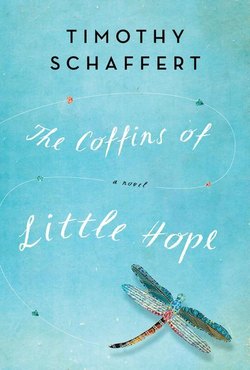Читать книгу The Coffins of Little Hope - Timothy Schaffert - Страница 15
На сайте Литреса книга снята с продажи.
· 9 ·
ОглавлениеDoc and his sister, Ivy, had been very close growing up. The two had not been tragically orphaned—they’d both been in their twenties when their parents’ car had slid off a tall, wet bridge. But Doc inherited the County Paragraph much too young, and it all possessed an urgency that distracted him. He took to wearing a linen suit and straw porkpie hat, elements of style that, in my honest opinion, hurt him in the community. Such dandification was why our readers preferred not to take him seriously. They’d loved his father’s editorials, his gentle turns of phrase and patriarchal commonsense. His father had been practiced in his plainspokenness. And though the neckties Doc wore to work were from his father’s collection of garish, handpainted ties bought on vacations (leggy Vegas showgirls in midkick, hula dancers with hibiscus bras) that had endeared Doc’s father to everyone and rendered him approachable and unpretentious—on Doc they looked affected.
Ivy, meanwhile, fell into despair, feeling bereft not just of her parents but of Doc, now so newly responsible. Doc was fascinated by his sister, and he’d always been a willing audience for her every mad turn and dizzy spell. I’d long felt that Ivy’s incapacity for everyday life was put on for Doc’s benefit. She was mesmerized by his sympathy.
Ivy mourned her parents by falling in love, dangerously so, with a man beautiful but demented, and she then became pregnant. Tiff doesn’t now even have a photo of her father because Ivy burned any pictures to an ash that she then spread ceremoniously across the dirt of the teacup roses she’d planted in memory of her mother.
In Ivy’s sudden absence, seven-year-old Tiff showed all the classic signs of abandonment—bed-wetting, sleepwalking, heartbreaking crying jags. But Doc, in my very biased opinion, quickly took her mother’s place. Ivy never called, never remembered a birthday. Once a postcard from Avignon arrived with a melodramatically illegible scrawl—“Tiff, Please never forget me,” she’d written, so clearly engrossed in her own fiction of herself. I wanted to write back to her to tell her we’d all laughed. We hadn’t laughed, though. We’d wandered around in a funk for days, saddened that we’d had to be reminded of her and her indifference.
Doc and Tiff established their own traditions, and even now they still sit in the yard on Sundays, in sunglasses, on a blanket, reading aloud to each other, intensely, from books of instruction for magicians. Through catalogs, online sites, and road trips to estate auctions, they amassed closets full of tricks and a basement of magic cabinets. They had capes with hidden pockets and a magician’s assistant’s skimpy, feathery getup, its pink plumage mangy, having been nibbled away to sticks by dust mites. They stalked the yard’s doves and rabbits in order to test their false-bottomed birdcages and collapsible top hats. They played poker with decks with five aces, lit firecrackers to produce silk carnations with an innocuous pop. They plucked coins from each other’s nostrils, rubber mice from their ears, and miles of knotted-up scarves from their comically gaping mouths.
It had been Doc’s dream, since his childhood, to open a magic shop. As a boy, he’d had no interest in working for the newspaper; rather, he’d pictured himself in a city of theaters. Whenever an illusionist needed a new fake thumb for his finger hatchet or a mirrored box for the segmenting of his assistant, Doc would be the supplier in this dream city of his. He’d have insights into all the sturdiest accoutrements of professional trickery, but he’d also serve the novice, the hobbyist, by offering the most convincing spyglasses, the foulest pepper gum.
In Tiff he’d found a worthy acolyte. She was fellow magician, assistant, and randomly selected audience member, all in one. By the time her mother returned from France, Tiff had mastered skills of invisibility. Tiff could still herself with an eerie precision, softening her heartbeats and stopping her breath. She’d go fetal in order to curl herself into the narrowest nook or cranny.
It was the summer Lenore went missing that our Ivy returned. With inheritance and insurance money that she’d miraculously avoided squandering, Ivy bought a house a few blocks from our houses. She painted it pink, as Tiff had requested, though Tiff had been mostly joking when she’d suggested it. At the café, where we would go for roast-beef sandwiches and cups of strong coffee, Ivy would order in French, then giggle before correcting herself.
“You can move back in with me whenever you’re ready,” she told Tiff the day she arrived with gifts of new dresses, much too small, which Tiff dutifully modeled, leaving the buttons undone up the back or shrugging her shoulders to give her arms the appearance of not being too long for the sleeves.
Ivy fashioned a bedroom for Tiff, gluing glow-in-the-dark stars to the ceiling and painting clouds on the walls, all in her approximation of what she thought a girl like Tiff might like. “I’ll let you know the second it’s ready,” she told Tiff, and we waited, curious about ourselves, wondering what we’d all do once the room was finished.
